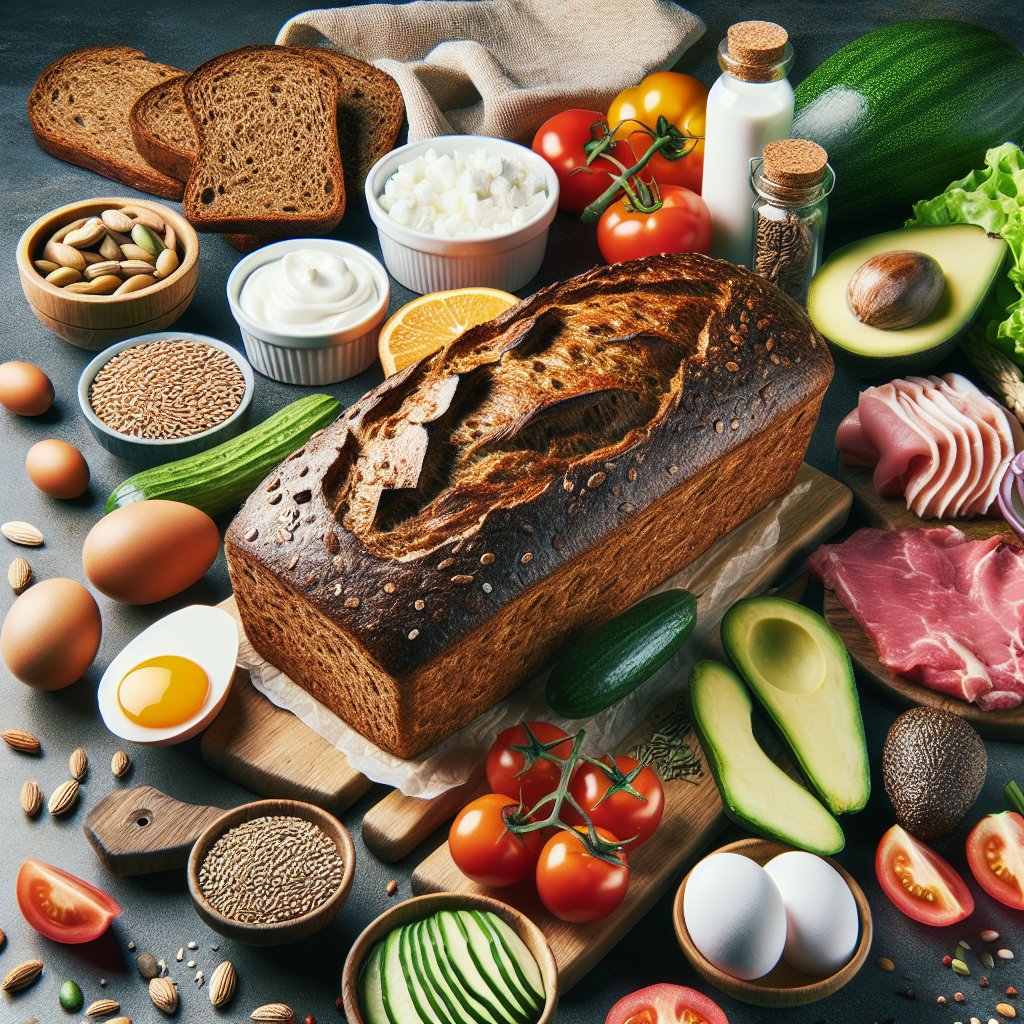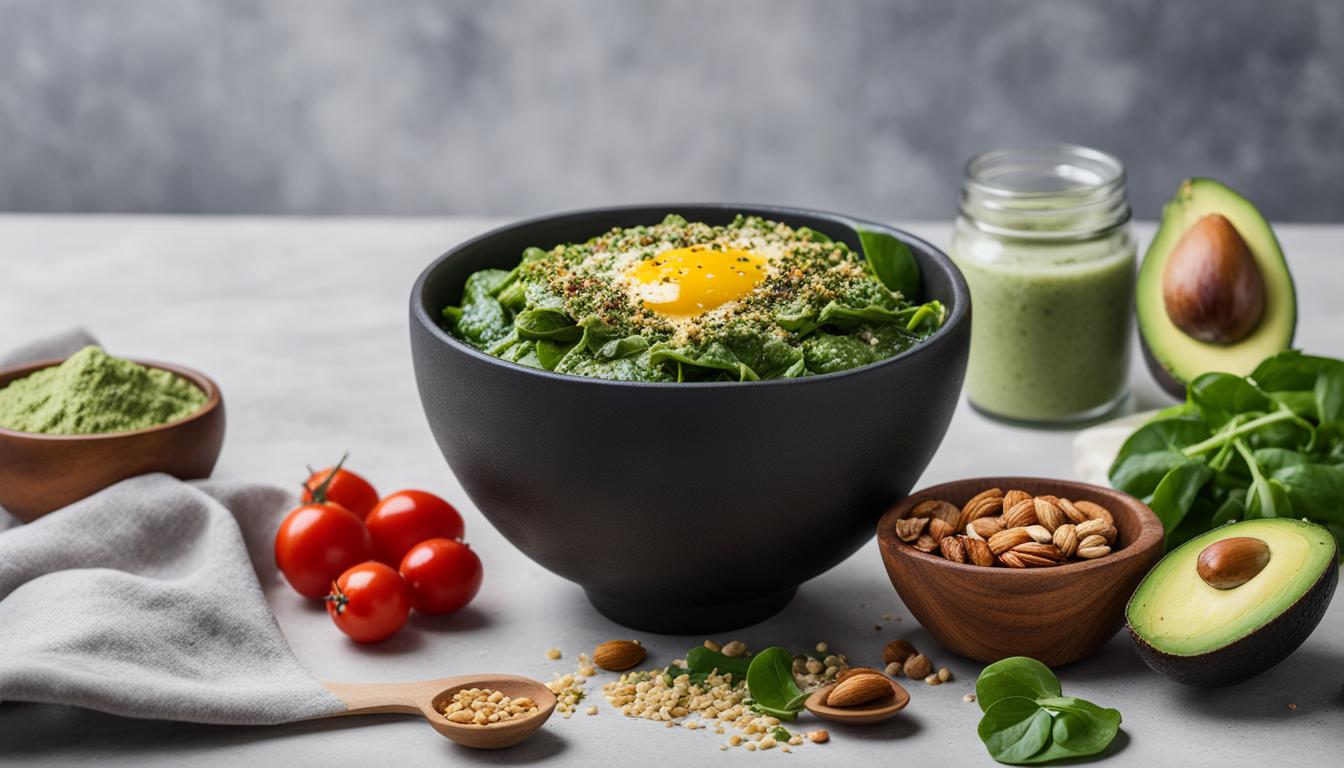Discover the Secret to Keto Success with Nutrient-Packed Rye Bread: A Must-Try for Your Low-Carb Journey!
What Makes the Keto Diet So Popular?
Welcome to the world of the ketogenic diet, where low-carb, high-fat foods are making a big splash! Many people are drawn to this way of eating due to its potential for weight loss, improved blood sugar control, and increased energy levels. And one food that’s been garnering a lot of attention in the keto community is rye bread.
The Allure of Ketogenic Living
The ketogenic diet has gained popularity not only among individuals looking to shed excess pounds but also among those seeking to manage conditions such as diabetes, polycystic ovarian syndrome (PCOS), and metabolic syndrome. Scientific research has shown that the keto diet can lead to greater weight loss compared to a low-fat diet, alongside improvements in triglyceride and HDL cholesterol levels.
Additionally, the keto diet has been associated with increased feelings of fullness and reduced hunger, which can make it easier to adhere to calorie-controlled eating plans. These factors contribute to the diet’s appeal and its growing popularity in health and wellness circles.
The Rye Bread Revolution
As the interest in low-carb, high-fat foods continues to grow, rye bread has emerged as a top contender in the keto-friendly pantry. Rich in fiber and nutrients, rye bread offers a delicious alternative to traditional high-carb bread, making it a key player in the quest for nutrient-packed, low-carb options.
Research has shown that rye bread, with its high fiber content, can promote feelings of fullness and assist in weight management. Furthermore, studies indicate that rye bread may have a lower glycemic index compared to wheat bread, contributing to better blood sugar control and reduced insulin response.
As interest in rye bread and its potential benefits for those following a ketogenic lifestyle continues to rise, it’s no wonder that it has become a trending topic in the world of low-carb, high-fat eating.

Benefits of Rye Bread on Keto Diet
When embarking on a keto diet, finding satisfying and delicious alternatives to high-carb foods can be a game-changer. One such substitute that’s been gaining attention in the keto community is rye bread. This hearty bread not only offers a unique flavor and texture but also boasts several nutritional benefits that make it a viable option for those following a low-carb lifestyle.
Nutrient-Rich Profile
Rye bread is packed with essential nutrients that can complement a keto diet. It contains a good amount of fiber, which is crucial for digestive health and can aid in maintaining a feeling of fullness, making it easier to adhere to your low-carb goals. Additionally, rye bread is a good source of magnesium, phosphorus, and B vitamins, which are vital for overall well-being.
A study published in the American Journal of Clinical Nutrition found that a diet high in whole grains, such as rye, was associated with a reduced risk of major chronic diseases, including cardiovascular disease and type 2 diabetes. This suggests that incorporating rye bread into a low-carb diet may have positive implications for long-term health.
Low Glycemic Index
One of the key benefits of rye bread for those on a keto diet is its low glycemic index (GI). Foods with a low GI are digested more slowly, leading to a gradual rise in blood sugar levels, which can support better blood sugar control. This characteristic is particularly advantageous for individuals aiming to minimize their carbohydrate intake while maintaining steady energy levels throughout the day. A study in the European Journal of Clinical Nutrition revealed that rye bread elicited significantly lower postprandial (after-meal) insulin responses compared to wheat bread, making it a favorable choice for individuals with insulin resistance or those seeking to manage their weight.
Enhanced Satiety
Another compelling reason to consider rye bread on a keto diet is its potential to promote satiety. The combination of fiber and complex carbohydrates in rye bread can contribute to a greater sense of fullness and satisfaction after consumption. This can be particularly beneficial for individuals striving to adhere to their low-carb regimen without feeling deprived or constantly hungry. A study in the Journal of Nutrition found that rye bread significantly increased feelings of fullness in comparison to white wheat bread, indicating its potential role in supporting weight management goals.
Keto-Friendly Bread Options
While traditional rye bread may contain higher levels of carbohydrates, there are keto-friendly versions available that use ingredients like almond flour, flaxseed meal, and vital wheat gluten to significantly reduce the carb content. These alternatives provide a low-carb option for individuals adhering to strict ketogenic guidelines. When choosing a rye bread for your keto journey, it’s important to carefully examine the nutritional information and ingredients list to ensure it aligns with your dietary objectives.
In conclusion, rye bread can be a valuable addition to the keto diet, offering a range of nutrients, a low glycemic index, and potential satiety benefits. While it may require some exploration to find the most suitable option for your specific carb restrictions, the nutritional advantages make rye bread a worthy consideration for those seeking variety and satisfaction in their low-carb lifestyle.
Nutritional Value of Rye Bread
When it comes to the ketogenic diet, finding the right balance of macronutrients and micronutrients is essential. Rye bread is a popular choice for many, but some might wonder how it fits into a keto lifestyle. Let’s dive into the macronutrient and micronutrient content of rye bread and explore its compatibility with the keto diet.
Macronutrient Content
Rye bread is known for its rich nutrient profile, making it a great addition to a low-carb, high-fat diet like keto. Let’s break down the macronutrient content of rye bread:
Carbohydrates: A 1-ounce (28-gram) slice of rye bread contains approximately 15 grams of carbohydrates. However, it’s important to note that around 9 grams of these carbohydrates are dietary fiber, which can be subtracted, resulting in a lower net carb content.
Protein: Rye bread is also a source of protein, with about 3 grams per slice. Protein is crucial for maintaining muscle mass and supporting various biological functions within the body.
Fat: While rye bread is not high in fat, it can be paired with keto-friendly spreads or toppings to enhance the fat content of a meal.
Micronutrient Content
In addition to macronutrients, rye bread contains several essential micronutrients that are beneficial for overall health:
Fiber: As mentioned earlier, rye bread is a good source of dietary fiber. Fiber is important for gut health, digestion, and promoting a feeling of fullness, which can aid in weight management.
Vitamins and Minerals: Rye bread contains a variety of vitamins and minerals, including B vitamins, iron, magnesium, and manganese. These micronutrients play various roles in energy metabolism, bone health, and overall well-being.
Considering its macronutrient and micronutrient content, rye bread can be incorporated into a ketogenic diet, especially when consumed in moderation and as part of a well-balanced meal plan.
Impact on Blood Sugar Levels
Let’s dig into the science behind how rye bread affects blood sugar levels and its relevance to keto diet followers. Understanding this impact is crucial for making informed choices about the foods we consume. So, here’s how rye bread measures up.
When it comes to maintaining stable blood sugar levels, rye bread is a standout choice. Research published in the American Journal of Clinical Nutrition suggests that rye bread has a lower glycemic index (GI) compared to wheat bread. The study found that rye bread causes lower postprandial (after-meal) blood glucose levels compared to wheat bread. This means that consuming rye bread is less likely to cause a rapid spike in blood sugar levels, offering a more sustained release of energy.
For those following a ketogenic diet, managing blood sugar levels is a key aspect of achieving and maintaining a state of ketosis. Rye bread’s lower impact on blood sugar makes it a suitable option for individuals aiming to keep their carbohydrate intake low while enjoying a wholesome and satisfying bread.
The Secret Lies in Fiber and Nutrients
So, what makes rye bread a better choice for those mindful of their blood sugar levels? The secret lies in its fiber and nutrient content.
Research from the US National Library of Medicine emphasizes the positive impact of the high fiber content in rye bread. The study indicates that the fiber in rye bread contributes to a slower digestion process, leading to a more gradual and moderate increase in blood glucose levels. This slow and steady release of glucose helps prevent sudden spikes, providing a gentle and consistent source of energy.
Furthermore, rye bread is packed with essential nutrients such as magnesium, which has been associated with improved insulin sensitivity. This means that magnesium may help the body’s cells take up glucose more effectively, promoting balanced blood sugar levels.
When it comes to the keto diet, incorporating rye bread can provide a nutrient-dense and satiating option that supports stable blood sugar levels, ultimately contributing to the overall success of your low-carb journey.
High-Quality Ingredients in Rye Bread
When it comes to the ketogenic diet, rye bread might not be the first thing that comes to mind. However, with the right ingredients and recipe tweaks, it can be transformed into a keto-friendly option that you’ll love. Let’s delve into why using high-quality ingredients in rye bread is essential for a keto-friendly option.
The Importance of Rye Flour
Rye bread is traditionally made with rye flour, which brings a unique flavor and texture to the table. From a keto perspective, rye flour contains fewer net carbs compared to wheat flour, making it a great choice for those following a low-carb lifestyle. In addition, rye flour is rich in fiber, which contributes to a feeling of fullness and can aid in digestion. Studies have shown that the consumption of rye bread leads to lower insulin and glucose responses compared to wheat bread, making it a favorable option for individuals looking to manage their blood sugar levels.
Benefits of Using Almond Flour
For those who are looking to reduce the carbohydrate content even further, incorporating almond flour into rye bread recipes can be a game-changer. Almond flour is low in carbs and high in fat, making it a great fit for the keto diet. Research has shown that almonds, the primary ingredient in almond flour, may help decrease the risk of heart disease and improve insulin sensitivity. By combining rye and almond flour, you can create a nutrient-packed rye bread that aligns perfectly with your low-carb journey.
The Role of Psyllium Husk
Psyllium husk is a popular ingredient in keto baking due to its binding properties and high fiber content. When used in rye bread recipes, psyllium husk adds moisture and elasticity while contributing to the overall fiber content of the bread. Studies have indicated that psyllium supplementation can significantly reduce postprandial glucose and insulin responses, making it a valuable addition to keto-friendly rye bread for better blood sugar management.
Beneficial Fats from Quality Sources
Another crucial aspect of keto-friendly rye bread is the incorporation of beneficial fats from high-quality sources. Whether it’s through the use of extra virgin olive oil, coconut oil, or grass-fed butter, these fats not only enhance the flavor and texture of the bread but also provide essential nutrients. Research has emphasized the importance of consuming healthy fats for overall well-being, including improved heart health, cognitive function, and satiety. By choosing quality fats for your rye bread, you’re not only elevating its nutritional profile but also supporting your ketogenic lifestyle.
Conclusion
Utilizing high-quality ingredients in rye bread is fundamental in creating a keto-friendly option that aligns with the principles of the ketogenic diet. Whether it’s the unique properties of rye flour, the health benefits of almond flour, the binding effects of psyllium husk, or the incorporation of beneficial fats, each component plays a crucial role in making rye bread a perfect fit for your low-carb journey. By understanding and embracing the power of these ingredients, you can savor the delightful taste of rye bread while staying on track with your keto goals.

Discover the Secret to Keto Success with Nutrient-Packed Rye Bread: A Must-Try for Your Low-Carb Journey!
Incorporating Rye Bread into a Keto Meal Plan
When it comes to following a ketogenic diet, finding the right balance of low-carb, high-fiber foods can sometimes be a challenge. The good news is that with the right approach, you can include nutrient-packed rye bread in your keto meal plan without sabotaging your carb goals. Rye bread, particularly the variety made with whole rye grains, offers a unique nutritional profile that can enhance your ketogenic lifestyle.
Here are some practical and delicious tips and recipes to help you incorporate rye bread into your keto meal plan:
Tip 1: Choose the Right Rye Bread
When selecting rye bread for your keto meal plan, it’s essential to look for varieties that are truly low in carbohydrates. Many commercially available rye bread products may contain added sugars and refined flours, which can significantly increase the carb content.
Opt for rye bread that is made with whole rye flour and has a high fiber content. Look for labels that indicate a low net carb count, which is calculated by subtracting the fiber content from the total carbohydrates. This ensures that you’re choosing a keto-friendly rye bread option.
Tip 2: Open-Faced Rye Bread Sandwiches
An effortless way to enjoy rye bread on a keto diet is by making open-faced sandwiches. Start with a base of toasted, thinly sliced rye bread and add a spread of healthy fats such as mashed avocado or grass-fed butter. Top it off with your favorite keto-friendly ingredients, such as sliced cucumbers, smoked salmon, or a sprinkle of arugula. The result is a satisfying and visually appealing meal that’s perfect for lunch or a light dinner.
Tip 3: Rye Bread Croutons for Salads
Give your salads an exciting twist by using rye bread croutons as a crunchy, flavorful topping. Simply cube the rye bread into small pieces, toss them with a drizzle of olive oil, and season with keto-friendly herbs and spices like garlic powder and thyme. Bake or air fry the seasoned cubes until they are crisp and golden brown, then sprinkle them over your favorite low-carb salads for added texture and taste.
Tip 4: Rye Bread French Toast Casserole
Indulge in a keto-friendly brunch or breakfast with a delicious rye bread French toast casserole. In a mixing bowl, whisk together eggs, unsweetened almond milk, cinnamon, and a sugar-free sweetener. Arrange cubed rye bread in a baking dish, pour the egg mixture over the bread, and let it sit for a few minutes to allow the bread to absorb the liquid. Bake until the casserole is golden and set. This comforting dish is perfect for weekend mornings or special occasions.
Tip 5: Rye Bread Panini with Keto Fillings
Create a gourmet keto-friendly panini by using rye bread as the base and loading it with flavorful, low-carb fillings. Thinly slice your favorite keto-approved vegetables and cheeses, then layer them between two slices of rye bread. Grill the sandwich in a panini press or on a skillet until the bread is crispy and the fillings are warm and melty. The result is a satisfying and hearty meal that feels like a special treat.
By following these tips and recipes, you can easily incorporate rye bread into your keto meal plan while staying true to your low-carb goals. The versatility of rye bread opens up a world of delicious possibilities that can make your ketogenic journey even more enjoyable.
Potential Drawbacks and Considerations
While rye bread can be a delicious and nutrient-packed addition to your keto diet, there are some potential drawbacks and considerations to keep in mind. Understanding these points can help you make informed choices and ensure that rye bread fits seamlessly into your low-carb lifestyle.
1. Carbohydrate Content
One of the main concerns when consuming rye bread on a keto diet is its carbohydrate content. Rye bread, although touted for its health benefits, is still relatively high in carbs compared to other keto-friendly alternatives. According to the USDA National Nutrient Database, one slice of rye bread can contain around 15 grams of carbohydrates, with only 1-2 grams of fiber, ultimately contributing to the net carb count.
For individuals following a strict ketogenic diet, where the typical daily carb intake is around 20-50 grams, the carb content in rye bread could potentially take up a significant portion of their daily allowance. It’s important to be mindful of portion sizes and consider the carb content of rye bread when planning your meals to ensure it aligns with your macronutrient goals.
2. Gluten Sensitivity
Another consideration when incorporating rye bread into your keto diet is gluten sensitivity. Rye contains gluten, a protein composite found in various grains, including wheat, barley, and rye. For individuals with gluten sensitivity or celiac disease, consuming rye bread can lead to digestive discomfort, inflammation, and other adverse reactions.
If you suspect that you may have a sensitivity to gluten, it’s essential to opt for gluten-free alternatives to rye bread. Thankfully, there are several keto-friendly bread options available that are made with almond flour, coconut flour, or other gluten-free ingredients, ensuring that you can still enjoy bread while adhering to your dietary preferences and restrictions.
3. Potential Impact on Blood Sugar Levels
Despite rye bread’s lower glycemic index compared to traditional wheat bread, it’s essential to consider its potential impact on blood sugar levels, especially for individuals with insulin resistance or diabetes. Rye bread, although containing beneficial fiber and nutrients, can still cause an increase in blood sugar levels due to its carbohydrate content, albeit at a slower rate than refined grains.
For those who are closely monitoring their blood sugar levels, incorporating rye bread into their diet may require careful observation and testing to determine individual responses. It’s advisable to work with a healthcare professional or a registered dietitian to assess how rye bread consumption may affect blood glucose levels and to make adjustments as necessary to maintain metabolic health.
4. Additives and Processing
When selecting rye bread for your keto diet, be mindful of the additives and processing methods used in its production. Some commercially available rye bread varieties may contain added sugars, preservatives, or other ingredients that can detract from its nutritional value and potentially hinder your efforts to stay in ketosis.
Opting for whole grain, organic, or artisanal rye bread varieties with minimal added ingredients is a way to ensure that you are receiving the full nutritional benefits that rye bread has to offer without unwanted additives that can compromise your ketogenic goals.
By keeping these potential drawbacks and considerations in mind, you can navigate the incorporation of rye bread into your keto diet with awareness and mindfulness, ensuring that it complements your low-carb lifestyle while contributing to your overall health and well-being.
Conclusion
As we draw to a close, it’s clear that rye bread is a fantastic addition to a ketogenic diet, offering a plethora of benefits that can support your low-carb journey. With its fiber content, potential blood sugar control, and nutrient density, rye bread provides a unique option for those looking to enjoy bread while maintaining ketosis. Remember, not all rye bread is created equal, so be sure to look for whole grain, low-carb options to truly reap the benefits.
But let’s not forget the most exciting part – experimenting with rye bread recipes! From toasting it with avocado for a quick breakfast to using it as a base for an open-faced sandwich loaded with keto-friendly toppings, the possibilities are endless. Embracing rye bread on your keto diet doesn’t mean sacrificing flavor, variety, or satisfaction. In fact, it opens up a whole new world of culinary exploration.
Try Something New Today!
If you’ve been hesitant to incorporate bread into your keto lifestyle, rye bread could be the solution you’ve been looking for. It’s time to break free from the notion that bread is off-limits and instead, embrace the delicious, nutrient-packed option that rye bread brings to the table. Remember, moderation is key, so be mindful of your portion sizes to ensure you stay within your daily carb limits.
Whether you’re a seasoned keto enthusiast or just starting out on your low-carb journey, rye bread can add a delightful element of variety to your meals while keeping you firmly on the path to keto success.
The Verdict on Rye Bread and Keto
In conclusion, rye bread can be a game-changer for those following a ketogenic diet. Its low glycemic index, fiber content, and potential impact on gut health make it a worthwhile addition to your low-carb lifestyle. By choosing the right rye bread and being mindful of portion sizes, you can enjoy all the benefits it has to offer without derailing your keto efforts.
So, why not head to your nearest health food store or bakery, and pick up a loaf of nutrient-packed rye bread? It’s time to savor the joy of bread without compromising your commitment to a healthy, low-carb way of eating. After all, life is too short to pass up on delicious and enticing options that align with your health goals. Here’s to embracing the wholesome goodness of rye bread and effortlessly enhancing your keto experience!


